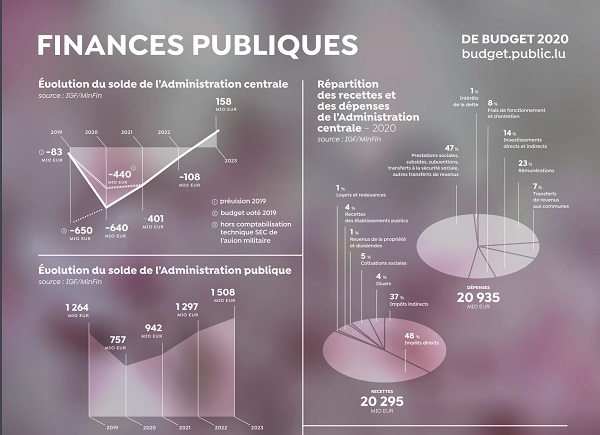 Credit: MFIN
Credit: MFIN
On Monday 14 October 2019, Luxembourg's Minister of Finance, Pierre Gramegna, presented the government's draft budget for 2020, as well as the draft multiannual budget for 2020-2023, to the Chamber of Deputies.
The draft budget for 2020 prioritises climate protection, public investments and the improvement of life for Luxembourg's population. Concerning its first priority, the 2020 budget aims to put climate protection at the forefront of addressing the major challenge of global warming. In this regard, the draft budget contains a series of budgetary measures designed to provide a framework for a global, cross-cutting and effective fight against global warming. Considering that all types of transport account for more than 60% of the country's CO2 emissions, the proposed measures focus mainly on soft mobility and preparations for the introduction of free public transport from 1 March 2020.
The 2020 budget will also make a significant contribution to consolidating Luxembourg's position as a centre of excellence in sustainable finance. Budgetary resources will be allocated to the promotion and support of initiatives in this area.
Overall, the draft budget provides for investments of up to €500 million in mobility, public transport, transport infrastructure, sustainable energy and the development of sustainable finance. The issuance of a first type of sustainable loan, with a maximum of one billion euros, is also provided for in the 2020 budget.
The second priority of the 2020 budget concerns record investments aimed at improving infrastructure and quality of life, as well as preparing the country for future challenges. Consequently, the government is implementing an ambitious public investment policy, which will see investments increase by 12% compared to 2019 to reach €2.8 billion.
Thirdly, the 2020 budget provides for concrete measures to further improve the lives of residents. These measures aim to support the development of a more inclusive, healthier and more equitable society that fully responds to the challenges posed by digitalisation. Indeed, the draft budget paves the way for the development of the 5G network in Luxembourg and aims to position the country among the pioneers of 5G.
In application of the European Standard SEC 2010, the government balance is established at €757 million (or 1% of GDP) for the year 2020. This surplus is expected to increase throughout the 2020-2023 period to reach €1.5 billion in 2023.
In addition, 2020 will see revenues and expenses exceed the €20 billion threshold for the first time. Government expenditure will thus amount to €20.9 billion, an increase of 6.5%. More specifically, 47% of expenditures are to be dedicated to social benefits and income transfers, 23% to salaries and 14% to public investments.
For their part, revenues will amount to €20.3 billion, which corresponds to an increase of 3.7% compared to the year 2019. These consist of 48% of direct taxes and 37% of indirect taxes.
The government balance for 2020 is set at a negative balance of -€640 million. This results from various factors such as the A400M military aircraft accounting, a record investment expenditure of €2.8 billion, a sustained government recruitment policy and a less steady pace of revenue. Over the next few years, this is expected to gradually improve, returning to a level close to balance in 2023.
Moreover, the 2020 draft budget plan respects the medium-term objective provided for by the European texts; whilst this objective is set at 0.5% of GDP for 2020, the structural balance reaches 0.9% of GDP. In 2020, Luxembourg is therefore set to continue to comply with its objective while preserving margins in relation to this threshold. The draft budget is set to also comply with the EU's Stability and Growth Pact.
Throughout the 2020-2023 period, Luxembourg's public debt is set to remain among the lowest in the EU, reaching 19.8% of GDP in 2020. This represents the first time since 2011 that the country's public debt falls below 20%. In addition, it will continue on a downward path to 17.3% of GDP in 2023, therefore remaining below the threshold of 30% of GDP provided for in the coalition agreement and below the 60% threshold set by European law.
Commenting on the 2020 draft budget, Pierre Gramegna stated: "The 2020 budget is a budget for climate protection, investments, and improvement of everyday life. Particular emphasis will also be placed on mobility. The introduction of free public transport from 1 March 2020 is one of the flagship measures. Public investment will be maintained at record levels, and for the first time in the country's history will reach €2.8 billion. The government is thus continuing on the path of its ambitious policy, while ensuring sound public finances. In an uncertain international context, this project is making a decisive contribution to strengthening the resilience of our economy, and preparing our country carefully for the challenges of the future".








